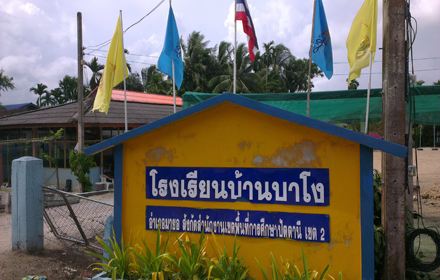The need to find out the truths behind teachers’ killings
Four teachers were shot dead and another seriously wounded within 19 days from November 22 to December 11.

The followings are identities of the victims, timings and locations where the shootings took place:
On November 22, Mrs Nanthana Kaewchan, director of Tha Kam Sham school in Nong Chik district of Pattani, was shot dead by suspected insurgents shortly after she left the school for home.
On December 3, Mrs Chatsuda Nilsuwan, a teacher of Ban Ya Ngo in Cho-Airong district of Narathiwat, was fatally shot by suspected insurgents as she was leaving the school for home.
On December 4, Mr Thirapol Chusongsaeng, a teacher of Ban Bo Koh, Su-ngai Padi district of Narathiwat was seriously shot as he was riding his motorbike for home.
on December 11, suspected insurgents stormed into the Ban Ba Ngo school in Mayo district of Pattani and shot to death Mrs Tatiyarat Chueykaew, the school director, and a teacher, Mr Somsak Kwanma, as they were having lunch at the school’s canteen.
Authorities were quick to blame the violent incidents on the insurgents in order to gain publicity or to terrorise the other Buddhist teachers. But was this the real motive behind the violent attacks against the Buddhist teachers?
Many local villagers however thought otherwise and suspected that the shootings of the five teachers which killed four of them within almost three weeks time might actually be revenge attacks perpetrated by suspected insurgents in response to violent attacks against a Muslim religious teacher or ustaz and local Malay Muslims.
On October 30, Mr Mahama Ma-ae, a Muslim religious teacher at Thammawitthaya Foundation School in Muang district of Yala, was gunned down in his pick-up truck in Yarang district of Pattani by gunmen armed with M16 assault rifles. Authorities claimed that the murder was carried out by suspected insurgents in order to put the blame on the government side but local villagers thought otherwise and suspected that he was killed by security forces as the ustaz might by suspected by the authorities of having links with insurgent groups. The former headmaster of the school, Mr Sapae-ing Masor, was accused of being a separatist leader and had a 10-million baht bounty on his head.
Local villagers suspected that the fatal shootings of teachers in Pattani and Narathiwat during November-December could be a revenge against the killing of the ustaz.
It was also pointed out that a few hours before the killing of the two teachers at Ban Ba Ngo school in Pattani at the school’s canteen on December 11, unidentified gunmen opened fire at a tea house in Tambon Tanyong Limor, Ra-ngae district of Narathiwat, killing four Malay Muslims, including a 11-month old baby and a 70-year old man. Local villagers believed that the two incidents might be linked with each other.
Informed sources said that the ustaz’s killing and the tea house attack were not widely reported in the Thai mainstream media but were given special attention by Malaysian media which sent a news team to cover the tea house attack incident.
Lately it was reported that Pol Col Thawee Sodsong, secretary-general of Southern Border Provinces Administration Centre, had ordered an investigation into the teachers’ shootings and the tea house attack.
Speaking on the condition of anonymity, a security officer said that the attacks against the Malay Muslims could be perpetrated by suspected insurgents to put the blame on the security forces. He said the targeting of Buddhist teachers might be intended to terrorise the teachers to quit teaching so the teachers would be short of teachers and finally forced to close down.
Meanwhile, a reliable source in the National Security Council told Isra news agency that the new breed of insurgents do not have any political ideology and have no respect for the safety of the innocent people, including Malay Muslims. Based on evidences collected, he said that the insurgents were involved in illegal business activities in the region such as oil smuggling and illicit drug trade.
Lt-Gen Samret Srirai, former commander of the Fourth Army Region, noted that the weak point of the state authorities was that there was no serious investigation to find out the real truth behind each violent incident.
"For instance if a teacher was fatally shot what needs to be done is to conduct an investigation to find out why the teacher was shot, why him and who would benefit for the victim’s shooting," he said, adding that the probe was not intended to put the blame on any particular party but to establish the fact in order that preventive measures could be adopted to prevent a repeat of such an incident.
But what need to be heeded by the government are the demands or proposals which were voiced in a series of peace forums which were recently held in the deep South with the support of the National Security Council.
Some of the demands include the adoption of Malay language in the formal educational curriculum in parallel with the Thai language; the delisting from the black list of suspects against whom there are no incriminating evidences against them; a special administrative zone for the deep South and revocation of all special laws in the region, especially the emergency decree.
----------------------------------------------------------------------------------------------------------------
Caption : Ban Ba Ngo school in Mayo district of Pattani
